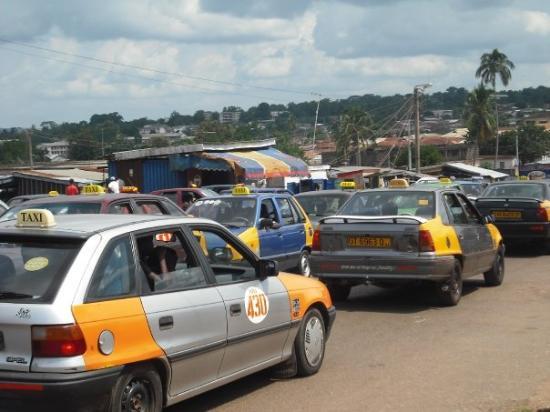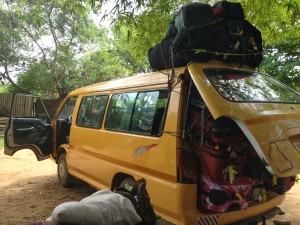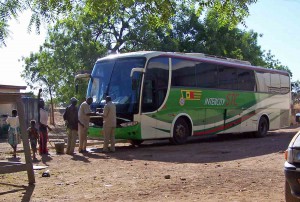When you’re living abroad, odds are that you won’t have a car, a comprehensive metro system, or even a bike. At first, all you have are your own two feet to take you where you need to go! But when you’re on a crunch for time or you have 30 kilos of luggage trudging you down, walking might not be the most ideal.
For those who travel and volunteer in Ghana, getting around is a bit trickier than hailing a cab or getting on a public bus. Public transportation is very different from that in parts of Europe, Canada, or the U.S., and it takes a little extra intel to navigate the system.
When you’re trying to get from point A to point B, depending on the distance and location, you have three main choices (beside walking). Here’s how to master each of them:
Take a Taxi
Hold your horses––taxis in Ghana might not be exactly what you’re picturing. The taxi service in Ghana is like the perfect hybrid of a personal driver and a public bus service. Let us explain:
All taxis can be identified by having orange outer corners. They can vary between comfortable, well-functioning cars with air conditioning (for an extra fee) and run-down cars that may be much cheaper. Use good judgment before you hail down specific drivers to choose the vehicle you’re comfortable in.
 Source
Source
Taxis tend to run mainly in towns and are a very affordable way to get around. Prices depend on a variety of factors––not always just distance. Your fare might be higher than usual if the traffic is bad, but you can anticipate it to be around 20 cents each way.
Many taxis are shared taxis that work similarly to a typical public bus service, used by 4 to 6 people. It sticks to a specific route, and you can get off and on anywhere on that route. You also have the liberty of taking a shared taxi off its route, but you must negotiate the price before you get in the car. You can even ask the taxi to take you across the country, as long as you pay the right price for it, as well as lodging for the driver, if need be.
Once you flag a taxi, greet the driver through the open car window and tell him where you want to go. Always negotiate a price before you get in (or you might be stuck paying double the rate!). It happens in cities all around the world––but taxi drivers sometimes charge higher flat-rates for tourists who aren’t familiar with the area. They know you have the money to travel, and that you may not know any better if you’re being up-charged! If you aren’t taking a standard route, ask your local volunteer staff and other friends you make for average rates before you negotiate your own.
Take a Tro-Tro
Tro-tros are something like a makeshift bus. For locals and budget travelers, this would be your first choice for transportation, especially if you’re going long distances. But we’ll be honest with you: they can be run-down or somewhat shaky.
When looking for a tro-tro, you can anticipate a beaten up van or minibus. They will only leave once they’re at capacity, and “capacity” has a whole new meaning in Ghana: These vehicles are usually altered to hold more seats, so your fellow passengers will likely be right against you, and your cargo will be in any space that allows, whether it’s where your legroom would be or strapped to the top of the vehicle. Everything and everyone is packed as tightly as possible. These are often the least comfortable option, but it is very cheap, around 5 Cedis or less per every hundred kilometers. If you’re taking them within the city, it is barely more than 20-50 pesewas––just a few coins! And because the fares are set by the government, you don’t have to worry about being overcharged like when you’re negotiating a long-distance taxi.
Despite the hodgepodge style, tro-tros are a very popular way of getting around, and this is how most locals travel. If you’re looking for an adventure, or at least for another way of connecting with the culture, tro-tros are a great option.
 Source
Source
Take a Bus
Ah, the bus. When it comes to comfort and safety, buses take the cake. When booking one, you can expect it to work like a standard coach service, often equipped with air conditioning, spacious reclined seats, and TVs for you to watch authentic Ghanaian movies.
 Source
Source
These buses will go from capital cities to capital cities taking only certain routes. It will cost you a pretty penny to get a seat onto one of these–usually 10 times that of a tro-tro. But it might be worth it for exceptionally long distances or if you’re pressed for time. They usually stick to their specific schedules, and who wouldn’t want that extra comfort on a 7-hour ride?
Takeaway
Navigating the transportation system in Ghana is both a practical skill and a rich cultural outlet. As you dive into this wacky, one-of-a-kind transit, you’ll learn a whole new adventurous side of yourself. Only in Ghana would riding a bus be considered an adventure. You won’t find anything like it anywhere else!
 Source
Taxis tend to run mainly in towns and are a very affordable way to get around. Prices depend on a variety of factors––not always just distance. Your fare might be higher than usual if the traffic is bad, but you can anticipate it to be around 20 cents each way.
Many taxis are shared taxis that work similarly to a typical public bus service, used by 4 to 6 people. It sticks to a specific route, and you can get off and on anywhere on that route. You also have the liberty of taking a shared taxi off its route, but you must negotiate the price before you get in the car. You can even ask the taxi to take you across the country, as long as you pay the right price for it, as well as lodging for the driver, if need be.
Once you flag a taxi, greet the driver through the open car window and tell him where you want to go. Always negotiate a price before you get in (or you might be stuck paying double the rate!). It happens in cities all around the world––but taxi drivers sometimes charge higher flat-rates for tourists who aren’t familiar with the area. They know you have the money to travel, and that you may not know any better if you’re being up-charged! If you aren’t taking a standard route, ask your local volunteer staff and other friends you make for average rates before you negotiate your own.
Source
Taxis tend to run mainly in towns and are a very affordable way to get around. Prices depend on a variety of factors––not always just distance. Your fare might be higher than usual if the traffic is bad, but you can anticipate it to be around 20 cents each way.
Many taxis are shared taxis that work similarly to a typical public bus service, used by 4 to 6 people. It sticks to a specific route, and you can get off and on anywhere on that route. You also have the liberty of taking a shared taxi off its route, but you must negotiate the price before you get in the car. You can even ask the taxi to take you across the country, as long as you pay the right price for it, as well as lodging for the driver, if need be.
Once you flag a taxi, greet the driver through the open car window and tell him where you want to go. Always negotiate a price before you get in (or you might be stuck paying double the rate!). It happens in cities all around the world––but taxi drivers sometimes charge higher flat-rates for tourists who aren’t familiar with the area. They know you have the money to travel, and that you may not know any better if you’re being up-charged! If you aren’t taking a standard route, ask your local volunteer staff and other friends you make for average rates before you negotiate your own.
 Source
Source
 Source
These buses will go from capital cities to capital cities taking only certain routes. It will cost you a pretty penny to get a seat onto one of these–usually 10 times that of a tro-tro. But it might be worth it for exceptionally long distances or if you’re pressed for time. They usually stick to their specific schedules, and who wouldn’t want that extra comfort on a 7-hour ride?
Source
These buses will go from capital cities to capital cities taking only certain routes. It will cost you a pretty penny to get a seat onto one of these–usually 10 times that of a tro-tro. But it might be worth it for exceptionally long distances or if you’re pressed for time. They usually stick to their specific schedules, and who wouldn’t want that extra comfort on a 7-hour ride?